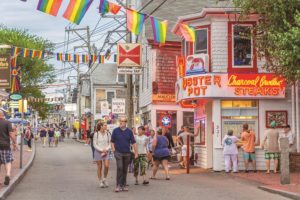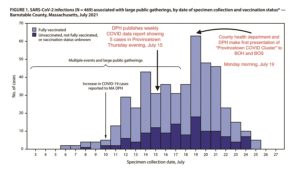PROVINCETOWN — Even though the number of new cases connected to July’s Covid-19 outbreak here continues to drop, businesses are seeing the booming sales of early summer take a nosedive.
The precipitous drop in restaurant business is caused by a lack of tourists in town, the owners say. To make matters worse, nonstop national and regional media coverage of the outbreak has fueled travelers’ fears.
Captain John Boats, which runs ferries from Plymouth to Provincetown, is accustomed to transporting 200 to 300 people per day. But a few days after news of the July outbreak broke, that number plummeted to just 50, said Bob Avila, one of the owners. “It’s devastating,” he added.
Meanwhile, the company’s whale watches and tours out of Plymouth are “booming,” said Avila, who, at 9 a.m. on Monday, saw only a handful of people waiting on MacMillan Pier.
It doesn’t seem to help that more than half of the space on the ferries is outside, or that they sanitize the boats between trips. “It’s not picking up,” said Avila. “But I’m hoping it will.”
Craig Malcolm, who has worked in Provincetown for 15 years and is a barker at Tin Pan Alley on Commercial Street, has never seen the town so dead in the peak of the summer season. Since Bear Week, which was July 10 to 18, Commercial Street has been quiet, he said.
“It’s like it’s February,” said Malcolm. After thinking for a second, he added, “We’ve had more people in February.”
The lack of visitors is catastrophic for the bottom lines of restaurants like Tin Pan Alley, which thrive on regular tourist foot traffic, said Paul Melanson, one of the restaurant’s owners. Tin Pan Alley has seen business drop by 40 to 60 percent in the past several weeks, depending on the day of the week and the time of day.

Down the street at Bayside Betsy’s, business is 25 percent of what it was, according to owner Irv Morgan — even though he had already opted to reduce capacity and focus on outdoor dining overlooking the bay.
In a summer that has been marked by labor shortages in the service industry, the drop in business presents a new conundrum: after struggling to staff their restaurants, owners are now forced to cut back on shifts for their employees. Melanson said he has cut three or four employees’ lunch and dinner shifts because of a lack of customers.
He tries to evenly distribute shifts, but if customers don’t return soon, he said, he will have to start laying off employees. One staff member has already quit because of a lack of shifts. When business dries up, “the rest of the overhead doesn’t vanish,” Melanson said.
Some restaurants, like Mac’s Fish House, were already set up for takeout and outdoor dining. There, business dropped a little, but mainly it shifted, said owner Mac Hay.
“Over the last few weeks, we saw some business shift from in-house to takeout,” said Hay. “We’re also lucky because we have so much outdoor dining.”
With his fish market next door, a number of customers are opting to buy seafood to take home and prepare themselves.
Mac’s Fish House didn’t change much of what it was doing last summer and decided to continue taking precautions this season. “In some ways, we sort of prepared for this,” said Hay. “We’re set up to pivot in whatever direction we need to.”
Hay, like other business owners who spoke to the Independent, questions the tone of the national news coverage of the Provincetown outbreak. “I think it should be widely publicized that in the Provincetown group there have been no deaths,” he said.
As long as people are cautious and make smart decisions, “I’m optimistic,” said Hay. “It’s not ending and everybody’s tired of it, but we have to persevere, because if we drop our guard that will just prolong the situation.”
Bubala’s by the Bay faced a painful irony when it came to staffing. Short-staffed because returning workers on H-2B visas had trouble getting to Provincetown, the restaurant saw a handful of workers finally arrive in mid-July — just in time for business to drop “more than 50 percent,” said Liz Roberts, the floor manager.
Business was “booming” until then, said Roberts, and although Bubala’s is now overstaffed, with customers canceling reservations “left and right,” she doesn’t want to let go of employees.
At Fanizzi’s Restaurant, returning to Covid-safe practices has made little difference in traffic. Owner Paul Fanizzi said the restaurant’s lunch business, which is typically full of families visiting for the day, has not returned despite mask rules, sanitizing, and ample outdoor seating. But he said he understands: “If your kid isn’t vaccinated, would you take them somewhere there’s an outbreak?”
Monday was one of the restaurant’s slowest days since it opened in 2001, Fanizzi said. He stood surrounded by a half dozen empty outdoor tables during the peak of the lunch shift.
Besides going back to earlier rules, some restaurants have added new Covid safety precautions.
The staff at Local 186 is tested every three days, said manager Oriana Conklin, a policy that was put in place after six fully vaccinated employees tested positive in July. The restaurant went from record-high numbers of diners in June to record-low numbers over the last several weeks, Conklin said. “It’s detrimental getting all of this bad press,” Conklin said.
Jimmy McNulty, an owner of Jimmy’s Hideaway, hasn’t taken any chances. In addition to wanting to ensure the safety of his vaccinated staff, he said he needs to protect himself and his partner, both of whom have compromised immune systems. He let go of two employees who weren’t vaccinated.
They’ve kept barriers up between the bartender and customers throughout the pandemic, and masks were optional for employees. “We’re lucky we have staff that aren’t going out and taking chances,” McNulty said.
McNulty sensed a change when he noticed some customers starting to come in wearing masks while some of his employees were still unmasked, so it was, in a way, a relief when the mask mandate was announced again. “We haven’t let down our guard,” he said.
His business has been dropping, too, and many of the people who don’t cancel reservations call to request outdoor dining. They’ve been getting more and more takeout requests, too, but “we’re not designed for that,” McNulty said. “It puts a strain on the kitchen.”
Carnival, which even without its signature parade is expected to draw visitors to town, is slated for the week of Aug. 15. It’s a big unknown for McNulty. “Knowing whether that’s happening might help people decide whether to come to Provincetown or not,” he said. “I absolutely want more people to come,” but based on an informed, safe decision.
Beyond that, McNulty is concerned that media coverage has ended up “sensationalizing” the outbreak. “I know it’s there, but they’re not covering what we’re doing about it,” he said. “The infection rates are coming down quickly.”
Several business owners who spoke to the Independent said that they were hopeful the tourists would return once national media coverage subsided. One good sign came from the Cape Colony Inn, where the blow of cancellations after July 4th weekend has been softened by some rebookings, according to general manager Steve Sleeper.
Liz Lovati, owner of Liz’s Cafe, Anybody’s Bar, said her restaurant has not seen “a dramatic difference” in business since the outbreak. Being on Bradford Street puts her outside the circuit of many short-term visitors. But Lovati said a core of year-round customers who have stuck with her through the pandemic are making a difference. She’s confident the restaurant will make it no matter what.
“I don’t have a crystal ball,” Lovati said of the prospect of tourists returning. “But it’s hard to keep people away from here.”
Provincetown Is Both Story and Symbol
In the past two weeks, Provincetown became a chapter in the saga of pandemic news coverage.
The New York Times and CNN both sounded the Covid alarm with renewed vigor on the danger of the Delta variant, using the local cluster here as evidence of the continuing national peril. Another wave of coverage followed the CDC’s study of the outbreak last Friday.
Much of the early coverage in national news used the experience of Provincetown to put new tread on a worn but still-needed message: the pandemic is not over. Stories pointed to the high number of breakthrough cases among vaccinated people — 74 percent of those infected, according to the CDC.
A CNN TV report, which has been broadcast by dozens of local news stations across the country, called Provincetown “a canary in the coal mine.” As of Aug. 3, the New York Times had written 10 articles that mention the Provincetown cluster, including a long feature on July 31, and it has been discussed twice on the Times’s popular podcast, The Daily.
The July 31 headline quotes resident Susan Peskin, who said about the pandemic, “It’s nowhere near over.”
Another CDC report has also cemented Provincetown’s place, however small, in the U.S. Covid narrative. Its further study of the Provincetown cluster spurred another round of national coverage. The Boston Globe and the BBC had headlines saying the “vaccines worked,” and pointing to the fact that, even as the reach of the outbreak has expanded, infecting more than 1,000 people so far, only seven have been hospitalized and none have died. Others keyed in on a reversal of one of Dr. Anthony Fauci’s earlier theories, as it now is clear that vaccinated people who contract Delta carry enough virus in their noses and throats to transmit it. —Cam Blair

